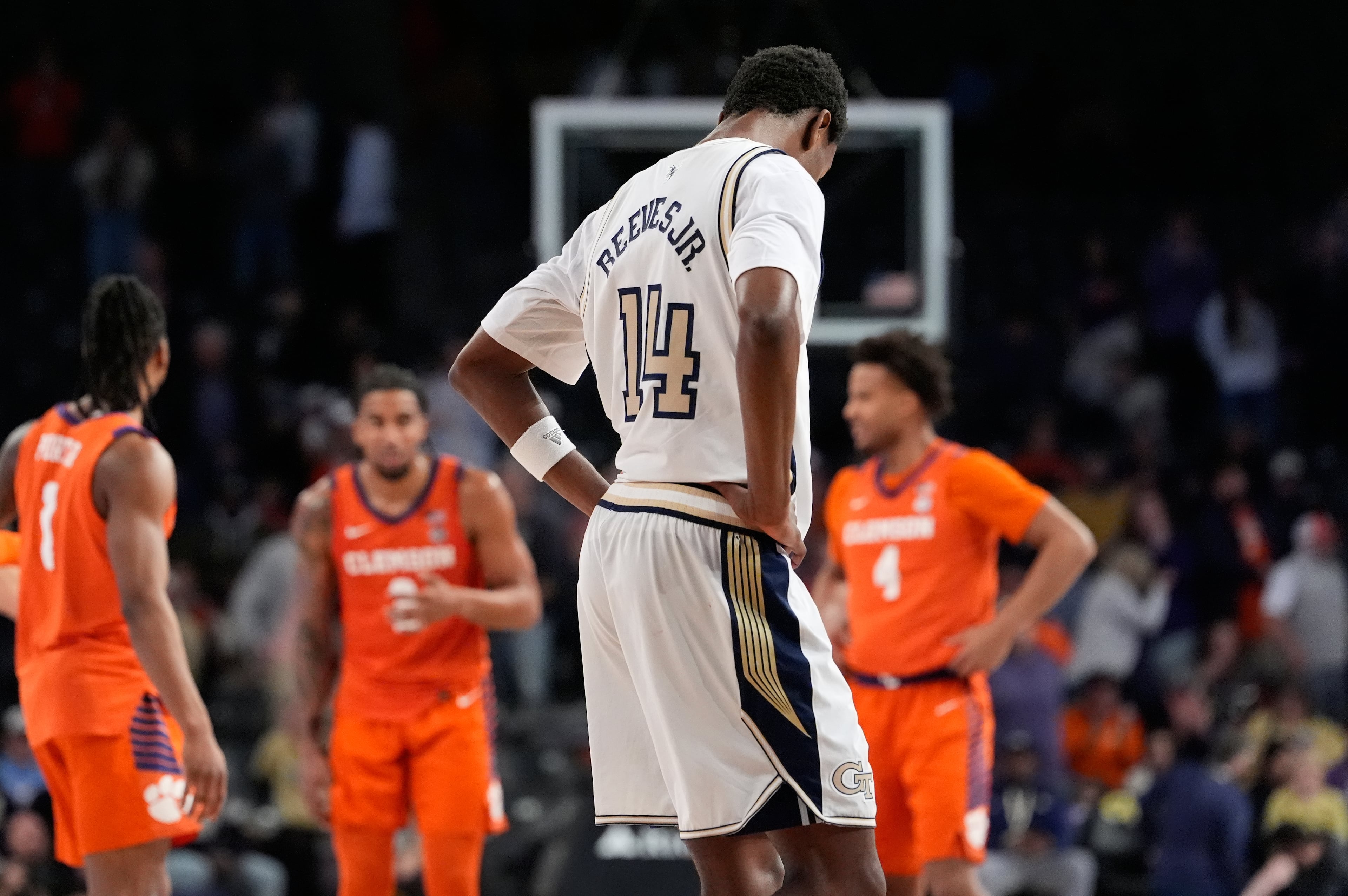Georgia Tech team dentist Aaron King remembered: ‘We all loved Aaron’

As the story goes, an Atlanta dentist convinced one of his patients, a Georgia Tech football player named Bobby Tharpe, to wear a mouthguard to protect his teeth.
It was 1960, a time when players wore helmets either without a facemask or with one or two bars. Aaron King’s mouthguard caught the interest of Yellow Jackets teammates who were interested in keeping their teeth.
So began a relationship with Tech athletes, coaches and staff that grew in depth and fondness for the next 59 years. The bond was made official in 1965 when King was anointed Tech’s team dentist, but his loyalty, consistent presence and good humor established a connection far more profound. King’s death last weekend at the age of 88 triggered an outpouring of sadness but also warm feelings and memories.
“We all loved Aaron like he was a member of our family,” Tech legend Bill Curry said. “I mean all of us.”
King was born in 1931 in Atlanta, an only child. He graduated from Bass High (since closed) in Little Five Points, served in the U.S. Army and graduated from Emory and Emory’s dental school. A third-generation dentist, he began practicing in 1957, when he would have been either 25 or 26.
Without siblings or a spouse – King never married – his association with Tech’s athletic department became a focal point in his life. He fitted every football and men’s basketball player for custom mouthguards, a voluntary service he continued through the incoming freshman class on this year’s football team. But more than that, his cheering presence was a reassurance to those near and far.
Jackets great Lucius Sanford said that before his return to Tech to work in the athletic department, “When I watched (games on) television and I saw him on the sideline, I felt like I was a part of it.”
In a 2004 interview with the AJC, King explained why he had drawn so close to Tech athletes.
“You can’t be younger, but you can think younger,” he said. “And you can think younger by being with younger people.”

Before mouthguards became mandatory, King was an advocate for them, touting not only the dental benefits, but also their effectiveness in helping prevent concussions. Former Tech quarterback Rick Strom, who shared a close friendship with King long after his playing days in the mid-’80s were over, heard from King directly his belief in the value of mouthguards. If there was a player who had gotten knocked in the mouth, Strom said, “he’d say, ‘Yeah, well, if he wore his mouthpiece, he’d be doing a lot better.’”
Curry didn’t wear one at Tech, but when he began suffering concussions and headaches in the NFL, King told him that his problems would stop if he started wearing a mouthguard. Curry did as told, and the issues went away, he said.
“I don’t know if he’s the first person in America to start making mouthpieces and to suggest we all wear them, but he’s the first one we heard of, certainly,” Curry said.
King continued to work through last week, his clientele including a number of Tech coaches and staff.
“Last time I saw him, it was out on the (practice) field,” Sanford said. “I said, ‘Doc, I think I owe you a visit.’ ‘Lucius, you owe me two visits.’”
His role as dentist aside, King was a friend, dependable in his support in an environment where competition and judgment are ongoing. Since 1967 in football and 1973 in men’s basketball, he attended virtually every home and road game until recent years. He also was a frequent visitor to both teams’ practices.
“He was always upbeat. He was always in your corner,” Strom said.
“He always had a smile on his face, no matter what,” former Tech running back Synjyn Days said.
In a tweet, Tech great Mark Price called him “one of my dearest & closest friends” and a mentor who “helped me grow into a man.”
Former men’s basketball coach Brian Gregory said that he learned more about Tech’s basketball history from King than anyone else.
“I think maybe his greatest trait as kind of a member of the support staff was he always saw the best in every player,” Gregory said. “As a coach, if you’re down on someone, if you were around him, you weren’t going to be down on that guy very long because he was going to figure out a way to tell you something good about that guy.”
When Sanford arrived on campus in 1975, the football team had only recently been integrated.
“Particularly when you look at my era, looking back, and transitioning in, you were looking for acceptance,” said Sanford, who is African American. “And he was consistent every day. Every day.”
Tech made King an honorary letter-winner in 1990 and inducted him into its sports hall of fame in 2004.
“I just hope that I’ve been able to help our student-athletes, that I’ve been able to set a good example and that they’ve been able to benefit from having me around,” King said in a Tech publication before his 1990 honor.
Tech was not King’s sole source of community. He was close with partners at his dentistry. He also was a licensed pilot and a committed air-racing official and photographer, traveling annually for races in Reno, Nev., and Oshkosh, Wis. Strom said that King had an award in his Collier Hills home from an air-racing association acknowledging his 60 years of service.
“He lived a very full and interesting, interesting life,” Strom said.
A visitation will be held from 2-5 p.m. Sunday at H.M. Patterson & Son-Spring Hill Chapel, with a funeral at 10 a.m. Monday at Second-Ponce de Leon Baptist Church. He leaves behind hearts and thousands of rows of intact teeth better for his presence.
“Unsung hero,” Curry said. “He will never get the credit he deserves.”


